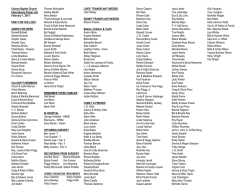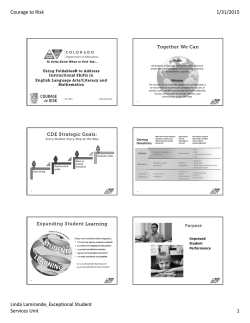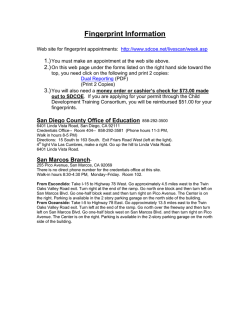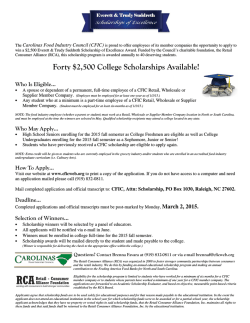
Vice President for Research and Scholarship
Vice President for Research and Scholarship The Linda Hall Library of Science, Engineering, and Technology Kansas City, Missouri The Linda Hall Library, the largest privately supported library of science, engineering, and technology in the United States, invites applications and nominations for the position of Vice President for Research and Scholarship. The Vice President will have overall stewardship of collection development and will play a major role in building upon the library’s outstanding reputation as a national and international destination for advanced research in science and the history of science. The Linda Hall Library The Library, located in a fourteen-acre arboretum in Kansas City’s cultural community, was created from trust funds established by local businessman Herbert F. Hall and his wife Linda S. Hall. Over the years Herbert Hall had amassed a sizable estate through his grain business and since he and Linda had no direct heirs, they carefully considered the disposition of their estate. They hoped “that their wealth might build up an important cultural agency as a contribution to the city in which they made their home.” (Kansas City Star, October 15, 1945) The Halls earmarked a $6 million gift for the founding of a “free public library for the use of the people of Kansas City and the public generally.” The bequest stipulated only that the Library was to be located on the grounds of the Hall estate, and that it was to be named in honor of Linda, who died in 1938. Herbert died in 1941. In 1941, the Board of Trustees, consisting of five businessmen named by the Halls, hired consultants from the national library community to advise them about the type of library that should be established. After extensive research and briefings with local and regional leaders, the consultants recommended the creation of a science and technology library. The foundation for the collections was determined by the Trustees who defined the Library’s area of specialization as “covering the fields of basic science and technology.” Clinical medicine, dentistry, and business were excluded since other local and regional libraries collected these subjects. Today the Board of Trustees, comprised of distinguished civic and business leaders in Kansas City, continues to provide outstanding leadership and support to the Linda Hall. The Board is planning to expand to support future growth. In 1945 the trustees named Joseph C. Shipman, a librarian and former chemist, as the Library’s first director, and the Library opened officially in 1946. Shipman led the Library for twenty-nine years and during his long and distinguished tenure, he began Linda Hall Library, Vice President for Research and Scholarship, Page 2 of 8. to build the Library’s collections. He spearheaded the development, in particular, of the outstanding history of science collection. Following his illustrious tenure there were four directors: Thomas Gilles, 1974–1982; Larry Besant,1982–1985; Louis Martin,1986– 1993; and C. Lee Jones, 1993-2006. Current Leadership In 2008 the trustees named Lisa Browar President. Prior to accepting this position, she was University Librarian at The New School in New York City from 2002 until July 2008. She began her career as Assistant Curator of the Yale Collection of American Literature at Yale University’s Beinecke Library and proceeded to become the Curator of Special Collections at Vassar College, the Assistant Director for Rare Books and Manuscripts at The New York Public Library, and the Director of the Lilly Library at Indiana University (Bloomington). She has published and lectured widely on topics concerning literary biography, manuscript curatorship, and the history of the publishing industry. Under her leadership, the Linda Hall Library has continued to grow and flourish as a destination for scholars from around the world and attract a large regional audience for its diverse public programs, including a popular program celebrating the 100 anniversary of the Panama Canal with the author and two-time Pulitzer Prize winner David McCullough, as the speaker. Other popular lectures included anthropologist Richard Wrangham on the ways in which fire and the ability to cook food socialized early humans and made us “human,” John Edward Huth on the “lost art of finding our way,” or the ways in which GPS robs us of our innate ability to determine direction. In addition, Browar and her colleagues strive to link “science to the broader culture” in order to make science and its history more accessible to those who may not have been trained in science and to highlight the intersection of science with other endeavors—for example, the arts, humanities, and sports. The Linda Hall lecture series has become very popular, attracting large audiences from Kansas City and surrounding areas. th In order to facilitate implementation of an ambitious new set of strategic priorities most effectively, Browar is currently restructuring the organization, adding critical new positions, and moving toward the increasing use of collaborative teams to manage Library-wide projects. This multidisciplinary approach will strengthen the Library both internally and externally. The Collections Since its founding, the Library has built one of the nation’s preeminent collections of research materials relating to all areas of science, engineering, and technology. The Library’s collection is exceptionally strong in the history of science, mathematics, astronomy, physics, and chemistry. The Library also collects extensively in geology and biology including botany, zoology, and microbiology. The collection development policy includes the acquisition of monographs, conference proceedings, indexes and abstracts, documents, technical reports, and other reference materials in addition to and in support of the Library’s journal collection. Although Linda Hall Library, Vice President for Research and Scholarship, Page 3 of 8. the Library has been regularly acquiring materials since 1946, several acquisitions are specifically worth noting. The Library’s first major purchase was the 62,358-item collection of the American Academy of Arts and Sciences in 1946. This acquisition provided a strong foundation for the Library’s collections: it included journals, rare books, and the exchange program that supports the interchange of material with foreign academies and societies. A second significant acquisition occurred in 1985 when part of the library of the Franklin Institute was transferred from Philadelphia. Nearly six hundred serial titles were added to the Linda Hall Library, increasing or completing runs of serials titles, and adding new titles. In 1995, the United Engineering Foundation, the successor organization to the United Engineering Society founded in 1904 with the generous support of Andrew Carnegie, transferred the Engineering Societies Library (ESL) to Linda Hall, an acquisition equal in significance to the Academy collection, and greater in the number of volumes received. The ESL collection added depth to both the journal and monograph collections, especially with material published before 1950. Today, the Linda Hall’s collections include over half a million monograph volumes, more than 48,000 journal titles, conference proceedings, reference works, government publications, and technical reports, as well as 200,000 industrial standards, engineering society conference papers, and U.S. patents. The Library’s history of science collection, containing printed books from the fifteenth century to the present, is particularly strong. More than 40,000 titles are currently represented, including a complete set of the Philosophical Transactions of the Royal Society of London, beginning in 1665, and important volumes by Copernicus, Galileo, Francis Bacon, Isaac Newton, and Charles Darwin. The Library also serves as a U.S. patent and trademark depository. A non-circulating research library, the Linda Hall is an important resource for researchers and students from both industry and academia, providing reference and document delivery services to users across the globe. In 2012 the Linda Hall Library formed a strategic partnership with the Center for Research Libraries (CRL) to preserve and develop their historical research collections comprised of American and foreign scientific and technical publications, and to make the combined 50,000 journal titles available electronically through on-demand digitization and traditional document delivery for the more than 200 CRL-member research libraries throughout the world. Residential Research Fellowship Program • • • • Residential fellowship opportunities for durations of 1-9 months; Applicants must be engaged in research leading to a doctorate or in possession of a doctorate, or the equivalent in research/publication experience; Research must involve extensive use of LHL collections; Recipients expected to be in residence for duration of fellowship; Linda Hall Library, Vice President for Research and Scholarship, Page 4 of 8. • • Fellows must deliver a public lecture based upon the work accomplished at LHL; and Fellows are encouraged to participate in the daily and intellectual life of LHL. Public Programs In addition to the goal of becoming an international destination for advanced scholarship and research, the Linda Hall Library strives to be a center for public education in the sciences. Linda Hall: • Sponsors regularly scheduled lectures on topics that help link science to the broader culture, delivered by experts in their fields; • Produces symposia and colloquia that offer in-depth examinations of current and emerging issues, topics, initiatives, and problems; and • Creates exhibitions commemorating significant events/achievements in scientific and/or engineering history. Linda Hall envisions significantly expanding its public programs over the next few years. In 2009, LHL produced its first one-day symposium, which was devoted to the topic of “climate change.” During the latter part of 2015, Linda Hall hopes to hold a smaller kind of event, a “colloquium,” the first of which will be devoted to the science of longevity or life extension. In the long term, Linda Hall hopes to do a symposium every other year and a colloquium every year. The Facilities The Halls lived in a Georgian mansion on twenty-one carefully tended acres in the heart of Kansas City. The original Hall home housed the Library from its beginnings until 1956 when the main library building of four floors was opened. The architectural firm Edward W. Tanner & Associates designed an impressive building of clean lines with a brick exterior and an interior with large windows and oak woodwork that reflects the surrounding environment. The main building provided sufficient space for the growth of the collection until the early 1960’s when plans were developed for an annex building that would house additional materials plus an auditorium and an exhibition room. The Annex, also designed by Tanner & Associates, was completed in 1965. Constructed on the site of the Halls’ home, it incorporates many architectural elements from the Hall house. The Linda Hall Library’s fourteen-acre urban arboretum was begun in the early 1900’s when Herbert and Linda Hall began landscaping the property around their new home. This tradition of thoughtful conservation and planting was embraced and carried to the present by subsequent trustees and staff of the Library. Open to the public, the arboretum attracts a significant number of visitors each year. In the early 1970’s, the History of Science Center was expanded, doubling the space for the Library’s rare book collection and other special collections. A four-floor extension on the south side of the main building was finished in 1978, adding study, office, and shelving space. The most recent addition to the Library, which was designed by Peckham, Guyton, Albers & Viets, Inc. and finished in 2006, was an expansion and renovation project that Linda Hall Library, Vice President for Research and Scholarship, Page 5 of 8. included a three-story addition to the Annex and renovation of the existing building. The buildings now comprise 220,000 square feet of library space and include over thirty-two miles of shelving. The addition also includes a cosmology "mini-theatre" where images and views of the cosmos from the Hubble Space Telescope and NASA science missions are delivered daily. Kansas City, Missouri Kansas City is the largest city in the state of Missouri. As of 2013 the city had an estimated population of 467,000, with a metropolitan area of 4.3 million. Founded in 1838 at the confluence of the Missouri and Kansas rivers, the city was incorporated in its present form in 1850. The city was the location of several battles during the Civil War, including the October 1864 Battle of Westport. Many people who work in Kansas City, Missouri, choose to live in adjacent Johnson County, Kansas, which has many attractive residential suburbs with excellent schools. Today, Kansas City offers a wealth of attractions. The striking landscape includes wide boulevards, parks, impressive architecture, and more than two hundred public fountains. The city's diversions include world-class museums, a vibrant arts scene, superb shopping, and great blues and jazz clubs. The city is well known for its historic contributions to jazz and blues as well as for its Kansas City-style barbecue. Cultural offerings abound in more than a dozen theaters, a resident symphony, ballet company, and opera. The city is also home to two nationally renowned art museums: The Nelson-Atkins Museum of Art and the Kemper Museum of Contemporary Art, as well as the American Jazz Museum and the Negro Leagues Baseball Museum. The popular National World War I Museum at Liberty Memorial is America’s only museum dedicated to sharing the stories of the Great War through the eyes of those who lived it. The Harry S Truman Library and Museum is located just ten miles away in Independence, Missouri. For the sports-minded, the KC Royals, the KC Chiefs, and the soccer team with the improbable name of Sporting Kansas City are major attractions. The Vice President for Research and Scholarship The Library seeks a Vice President for Research and Scholarship who, in collaboration with the President and Library staff, will strive to enhance Linda Hall's stature and reputation as a destination for advanced research and scholarship in science, engineering, technology, and their histories. S/he will supervise the continued growth and development of Linda Hall's General Collections and Special Collections. In addition, s/he will provide stewardship of the Linda Hall Fellowship Program, including strategic planning, enhancement of the program's stature and reputation, and assistance in securing program resources. The Vice President will play a critical leadership role in attracting active researchers and scholars to Linda Hall. The Vice President for Research and Scholarship reports to the President, and oversees a staff of about nine, including as direct reports the: • • Director, Fellowships and Research; Curator of Rare Books; Linda Hall Library, Vice President for Research and Scholarship, Page 6 of 8. • • • Curator of Contemporary Collections; Curator of Manuscripts and Archives; and Exhibition Coordinator. The Vice President for Research and Scholarship will lead the recruitment of outstanding professionals for these important positions. Peers include: • • • • Vice President for Information Technology, Technical and Access Services; Vice President for Public Programs; Vice President for Development; and Vice President for Communications (a new position). The Vice President for Research and Scholarship of the Linda Hall Library will be fortunate to join an institution with one of the nation’s premier science and technology collections and solid financial footing, with an endowment of $211 million and a Fiscal Year 2014 operating budget of $9.6 million. In collaboration with the President and senior colleagues, s/he will play a key role in advancing and implementing the Library’s strategic plan, with the primary goal of strengthening Linda Hall’s stature as a national and international destination for scholarship in science, engineering, technology, their histories, and related and emerging areas of scholarly inquiry through the following major areas of focus: • • • • Strengthen and expand the general and special collections; Strengthen scholarly engagement; Strengthen existing collaborative relationships with other libraries, consortia, and scholarly organizations, and seek similar new opportunities; Strengthen research and scholarship through the use of technology applications. Challenges and Opportunities The Vice President for Research and Scholarship will be responsible for overall stewardship of collection development and have a key role in: 1. Implementing the strategic plan, in collaboration with the President and senior colleagues; 2. Building a highly professional staff to advance the research program of Linda Hall, including Director of Fellowships and Research, Curator of Rare Books, Curator of Contemporary Collections, and Curator of Manuscripts and Archives. 3. Helping to foster a collaborative management approach, including encouraging and implementing the greater use of Library-wide teams; 4. Modeling a highly collaborative work style; 5. Helping to attract seasoned as well as younger scholars to the Fellowship Program; 6. Maximizing the potential of collaborative external relationships, e.g., with the Center for Research Libraries, the Independent Research Libraries Association, Linda Hall Library, Vice President for Research and Scholarship, Page 7 of 8. and the Philadelphia Area Center for History of Science, to enhance Linda Hall’s attractiveness as a research facility and to enlarge its geographic reach through affiliations and the increased use of technology; and 7. Increasing support for the Fellowship Program by identifying and helping to secure external funding. Specific responsibilities include overall stewardship of Linda Hall’s collection development. To that end: 1. Supervise the growth and development of Linda Hall’s General and Special Collections (daily oversight by Curator of Contemporary Collections, Curator of Rare Books, and the Curator of Manuscripts and Archives); 2. Provide overall stewardship of the Linda Hall Fellowship Program, specifically to lead program strategic planning, and assure the growth of program stature and reputation; 3. Work with the Vice President for Development to secure stable sources of program funding; 4. Work with the Director of Fellowships and Research and oversee research and onsite reader services; 5. With the Senior Management Team, set strategic goals and priorities to further Library’s mission; 6. Responsible for oversight of the Library’s collections (materials) budget; 7. With the President, represent Linda Hall to local, regional, national, and international constituencies (which may include other academic/research libraries and professional associations) with the goal of advancing Linda Hall’s mission as a destination for advanced research in science, engineering, technology, and their histories. The Candidate The successful candidate will be an effective leader with a record in innovating and managing change in a distinguished research library or other relevant setting and a background in the sciences, technology, or related discipline. An advanced degree in the History of Science or extensive research and publication in one or more of the scientific disciplines collected by Linda Hall is required. A Master’s degree in Library Science (MLS/MSIS/MLIS), or the equivalent in library experience, is preferred. Demonstrable success in attracting, hiring, training, and integrating professional staff is desirable. Appreciation of the potential to extend a library’s reach beyond its geographic location through the use of technology and familiarity with library technology and technology in general are important. A history of conceptualizing and implementing successful strategies for growth and developing public awareness and institutional support is important. Other relevant experience may include: • • Record of scholarship resulting in publication; Oversight of or participation in a resident fellowship program or research institute/center; Linda Hall Library, Vice President for Research and Scholarship, Page 8 of 8. • • • Record of administrative accomplishment; Teaching experience at the college or university level; and Record of ongoing participation in relevant professional organizations, societies, and conferences. The Search Process The Linda Hall Library has retained the services of Auerbach Associates, Inc., a Boston-based search firm, to assist with this search. Applicants should provide a cover letter, a résumé or curriculum vitae, and the names and contact information of three references. All nominations, applications, and inquiries should be sent to: Judith A. Auerbach, President Ellen Offner, Senior Consultant Auerbach Associates, Inc. 30 Hillside Terrace Belmont, MA 02478 617.489.4895 Email: [email protected] Electronic submissions preferred.
© Copyright 2026



